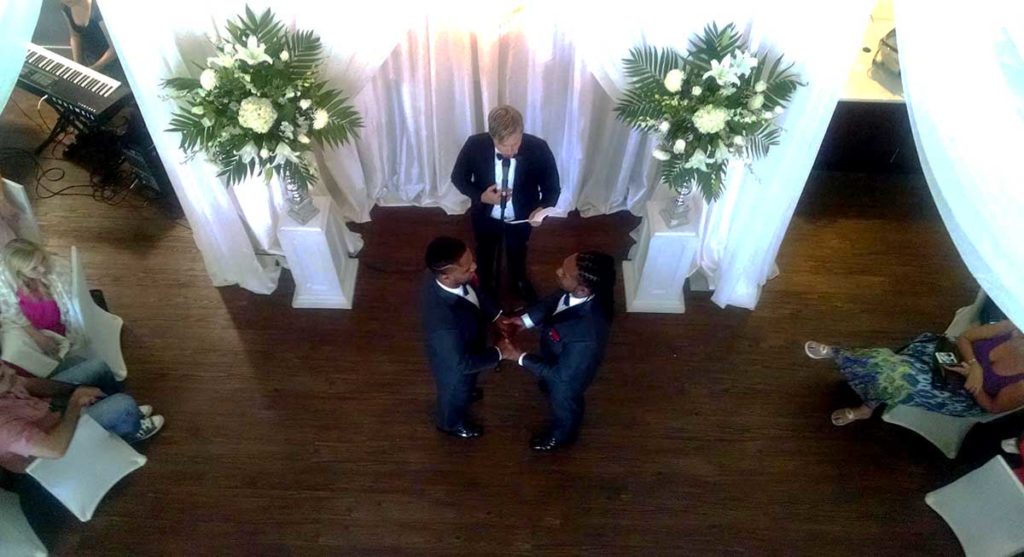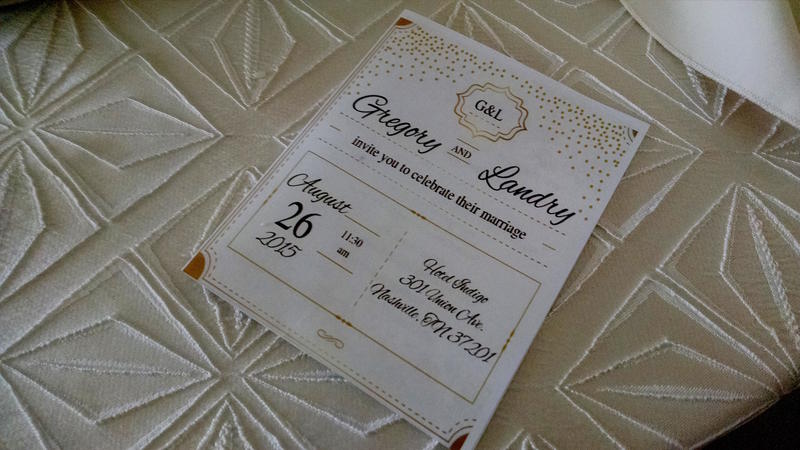
The guests turn to watch as two grooms stroll down the aisles. A pair of young African-American men in matching, slate-gray suits. They stand hand-in-hand and exchange their vows.
Gregory Cason and Landry Boyle got engaged New Year’s Eve. But their wedding day isn’t until next year.
It’s a mock ceremony, staged in a downtown Nashville hotel for an audience of wedding vendors.
The idea is to show them how to celebrate a same-sex marriage.
Cason
and Boyle didn’t have
to wait so long. But … why not?
“To rush to the courthouse … that’s the way some people want to do it,” says Cason. “But other people like myself really want this kind of ceremony-type thing to share with our family and with our friends.”
When the U.S. Supreme Court granted same-sex couples in Tennessee the right to marry in late June, many expected long lines at county courthouses.
There were some newlyweds
on the first day. But two months later, only about 800 gay and lesbian couples in Tennessee have wed.

Compare that to Massachusetts, a similarly-sized state. In the week
after it became the first in the nation to recognize gay marriage, nearly 2,500 couples wed — three times as many in just seven days.
The discrepancy can be explained
in part by there being fewer gay couples in Tennessee
and in part by Tennessee being among the last states to allow same-sex marriage. Many couples have already married elsewhere.
But it’s also true that, for those like Cason
and Boyle who are only now thinking about marriage, the dynamics have changed.
“A lot of people really want to take that time now and plan that traditional type wedding that they always dreamed of,” Cason says. “It takes time. “
According to supporters of same-sex marriage, the picture is more or less the same across the Southeast — slow and steady.
The wait might not always be by choice.
Accountant Joyce Peacock works with a lot of committed, same-sex partners. For them, marriage can be more complicated than it seems.
“It’s a whole rethinking of some of the ways that they’ve been operating,” she says.
Because they couldn’t marry, many same-sex couples worked out legal agreements that spell out who makes medical decisions if they’re sick or how their savings would be divided after death.
Getting married would actually undo those contracts.
“It’s just a whole new realm for people who have been living together in a relationship for 10 years and suddenly have the option,” she says. “And they want to know, how does that affect things? Because it does.”
Here To Stay
There’s another reason couples aren’t racing for the courthouse:
They no longer feel like they have to, because same-sex marriage appears to be here to stay.
Unlike past rulings, the Supreme Court decision is meant to be final, meaning no politician or judge could reverse the right easily.
Nashville event planner Amos Gott
welcomes the shift in thinking.
Gott
says a formal wedding — with a
venue, a minister, a walk down the aisle and a reception to follow —
can be a powerful statement.
“We go to traditional weddings to see a couple unite,” says Gott, who is gay. “You know, you’re there and you see it happen and therefore in your heart or in your mind, you know they’re married, you support that marriage. If we don’t get straight individuals used to seeing gay couples marry, it still feels like just going to a party.”
Formal weddings require a different approach to planning, says Gott. Simply booking a location can take months.
But
going slow could be good for the relationship, he adds.
“It’s one thing to want to get married and then when you get there, you’re like, ‘Oh wait!’,” Gott says. “Are we there? Do we have all those questions answered that a lot of couples go through counseling with ministers and otherwise to get to?'”
It’s a set of questions Gott
has given some thought to himself. “Always the planner, never the groom,” he says. “I’m not there yet.”
Gay or straight, says Gott
, marriage is a big step — not one to rush into.


